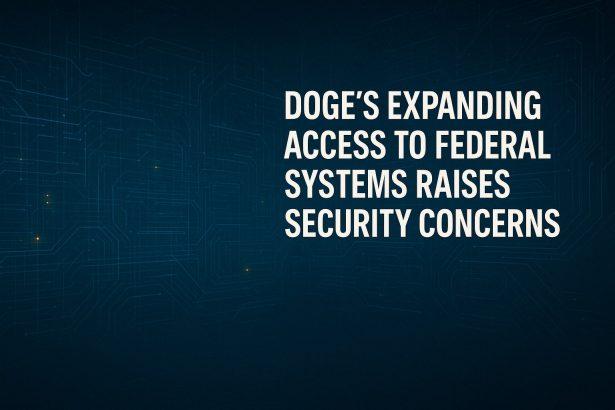Washington, D.C. — Elon Musk’s controversial Department of Government Efficiency (DOGE) is facing mounting scrutiny as it expands its reach across federal agencies. While the initiative was initially launched to streamline bureaucratic processes and inject innovation into government operations, its growing access to sensitive federal systems has triggered widespread concern among cybersecurity experts, lawmakers, and agency insiders alike.
Access to Sensitive Federal Data Raises Red Flags
DOGE personnel have reportedly been embedded in a range of federal institutions, from the Department of Justice to the National Labor Relations Board (NLRB), with broad and sometimes unmonitored access to internal systems. Sources familiar with the matter told Reuters that, at the NLRB, DOGE officials accessed extensive internal databases—some containing sensitive case files, whistleblower reports, and confidential personnel information. In the wake of this access, federal cybersecurity teams detected signs of unauthorized data exfiltration, sparking an internal investigation.
Even more concerning is the case of Christopher Stanley, a senior DOGE official stationed at the Department of Justice. Court documents and internet archives show that Stanley previously operated websites known for distributing pirated software and boasted openly about his hacking exploits in online forums. Despite this checkered digital past, Stanley somehow obtained and continues to hold an active federal security clearance, a fact that has stunned lawmakers during recent oversight hearings.
“Giving individuals with questionable cybersecurity ethics access to DOJ systems is more than irresponsible—it’s dangerous,” said Sen. Marsha Collins (R-TX), a ranking member of the Senate Committee on Homeland Security and Governmental Affairs. “This opens the door to insider threats of the worst kind.”
Cybersecurity professionals are echoing these concerns, warning that DOGE’s fast-tracked access to core federal networks may be undermining years of progress in federal cybersecurity strategy. The lack of rigorous vetting procedures and the absence of traditional background checks in DOGE’s onboarding process further amplifies fears of internal sabotage, data manipulation, and unauthorized surveillance.
Legal Challenges and Oversight Intensify
The expanding influence of DOGE has not gone unchallenged. Several legal complaints have been filed in federal courts seeking to limit DOGE’s access to classified and restricted information. In one high-profile case, a federal judge in D.C. issued a temporary injunction barring DOGE officials from accessing any Justice Department systems without direct supervision. The ruling came after whistleblowers disclosed instances of data being copied to off-site servers without proper authorization.
Civil liberties groups have also voiced their concerns, particularly regarding DOGE’s unclear reporting structure and lack of transparency. “There is no meaningful oversight of DOGE’s operations. It is a government agency operating in a grey zone, accountable to no one and trusted with too much,” said Maya Delgado, director of the Open Democracy Project.
Adding to the growing pressure, the Government Accountability Office (GAO) has launched a comprehensive audit of DOGE’s activities across several federal agencies. The audit will evaluate the department’s data handling procedures, cybersecurity safeguards, and overall compliance with federal laws, including the Federal Information Security Modernization Act (FISMA) and the Privacy Act.
“The federal government cannot afford to play fast and loose with its cybersecurity standards,” said GAO spokesperson Jeremy Moore. “Our job is to ensure that every agency, including newer entities like DOGE, abides by the rules and protects American data.”
A Growing Divide Between Innovation and Risk
Elon Musk, who has championed DOGE as a way to “disrupt the inefficiency of big government,” has defended the program in recent public comments. In a post on X (formerly Twitter), Musk wrote, “DOGE is exactly what this country needs—fresh thinking, fast action, and zero red tape. The haters just don’t get it.”
While some in Silicon Valley admire Musk’s efforts to bring tech agility to federal systems, critics argue that such disruption must come with guardrails—especially when it touches the sensitive machinery of national governance.
“The goal of innovation should never come at the cost of national security,” said cybersecurity analyst Dr. Fiona Ross, a former NSA advisor. “What we’re witnessing is a dangerous experiment being conducted in the heart of the federal government, without adequate safety protocols.”
Looking Ahead: What’s Next for DOGE?
As legal challenges mount and congressional investigations loom, the future of DOGE remains uncertain. The Office of Personnel Management (OPM) has reportedly paused further DOGE deployments pending the results of the GAO audit. Meanwhile, cybersecurity watchdogs continue to monitor the situation closely, fearing that the vulnerabilities introduced today could lead to more serious breaches down the line.
For now, one thing is clear: the federal government’s embrace of DOGE may be a bold step toward modernization—but it’s one fraught with risks that the nation can ill afford to ignore.




